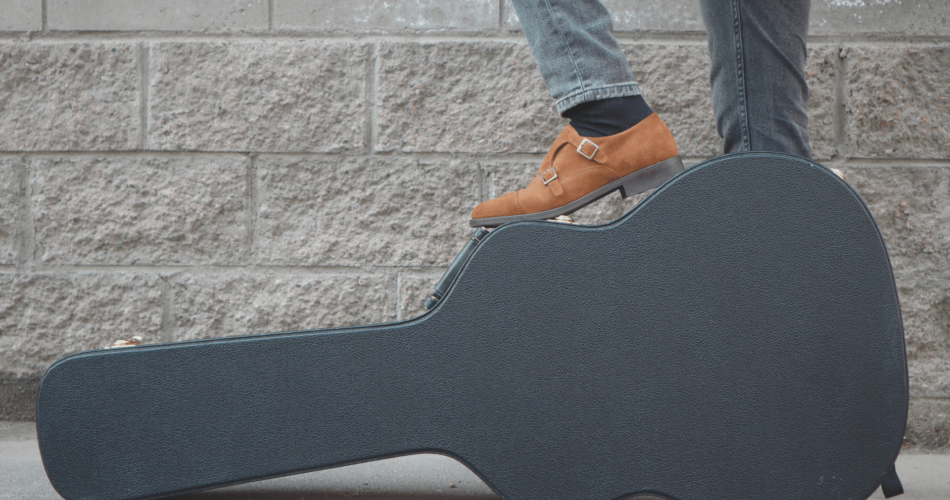As the temperature starts to drop, it’s important to take care of your guitar. Cold weather can have a significant impact on the health of your instrument. Whether you’re a professional musician or just starting, protecting your guitar is crucial. In this blog, we will explore the effects of cold weather on guitars and offer some helpful tips for keeping them safe during winter months. We’ll also discuss the ideal conditions for storing guitars and how to transport them safely in cold weather. From using humidifiers and dehumidifiers to playing your guitar in cold weather, we’ve got you covered with expert advice and common misconceptions about guitars in the cold. So, buckle up as we dive into everything you need to know about protecting your guitar from cold weather damage.
Understanding the Impact of Cold on Guitars
Cold temperatures can cause the wood of your guitar to contract, impacting its sound quality. Excess moisture in a guitar case is detrimental, especially in cold weather. Significant temperature fluctuations in cold weather pose a risk of damage to your guitar. Low humidity in cold weather can affect the joints of your guitar, influencing its sound quality. Keeping your guitar in a hard case in cold weather is essential for protection.
The Physical Changes in a Guitar Exposed to Cold
Exposure to cold weather causes the wood of a guitar to contract, impacting its sound quality. Joints are at risk of damage, and rapid temperature changes can affect tuning and fretboards. Prolonged exposure may impact glue and fretboards, posing a high risk of damage if precautions aren’t taken.
Potential Damage Risks for Guitars in Cold Conditions
Exposure to cold weather can risk damaging a guitar’s sound and physical structure. The low humidity level in cold conditions heightens the risk, impacting sound quality. Joints, tuning, fretboard, and excess case moisture are all at risk. Taking precautions can prevent bad things from happening.
The Ideal Conditions for Guitar Storage
Storing guitars in a hard case at room temperature is crucial in cold weather for good shape and prevention of damage. It’s important to maintain ideal temperature and humidity conditions to control the humidity level and prevent temperature swings. Ensuring controlled storage environment in January protects guitars from bad things like damage due to cold.
Importance of Temperature and Humidity Control
Preserving the shape of guitars in cold weather relies on maintaining room temperature. Controlling humidity levels is vital to prevent damage. Ideal temperature and humidity control are necessary. Guitars must be stored in a controlled environment to avoid damage. Ensuring the ideal temperature and humidity level is essential for preservation.
Best Practices for Storing Guitars in Winter
When storing guitars in cold weather, using a hard case is crucial for protection against extreme temperature changes and low humidity. It’s best to include a small humidifier in the case to maintain ideal humidity levels. This practice shields guitars from the risk of damage and ensures optimal guitar care during winter.
Protective Measures for Guitars in Cold Weather
Employing a hard case is crucial to guard guitars against temperature changes and shield them from cold weather risks. It’s the most effective measure to safeguard guitars from bad things that can happen due to low temperatures, ensuring guitar care in degrees Fahrenheit that are below ideal. Using a hard case is essential for protecting guitars in January and beyond.
The Role of Guitar Cases in Protection
Guitar cases play a pivotal role in safeguarding guitars from temperature changes in cold weather. The hard case provides the best protection, shielding guitars from potential damage. It is essential to utilize a hard case to protect guitars from the adverse effects of cold weather conditions, ensuring their safety and well-being.
Using Humidifiers and Dehumidifiers for Guitar Care
Maintaining the ideal humidity level in cold weather is crucial for guitar care. Using a small humidifier in a guitar case is a beneficial practice to preserve the instrument. It helps prevent potential damage risks and ensures the best conditions for guitar storage, especially when exposed to cold temperatures.
Use a Hard Case
Employing a hard case is essential for guitar care in cold weather, providing the best protection from bad things. The hard case is pivotal in shielding guitars from the risk of damage due to temperature changes. It is indispensable to protect guitars from the adverse effects of cold weather, ensuring their safety.
Store in a Temperature-Controlled Room
To maintain your guitar’s condition, store it in a room with stable humidity levels. Use a small humidifier to prevent damage and avoid rapid temperature changes. Storing the guitar in a hard case provides the best protection, as extreme temperature swings can affect its joints, so keep it in a stable environment.
Safely Transporting Guitars During Cold Weather
During cold weather, use a hard case to shield your guitar from temperature fluctuations during transport. Avoid leaving your guitar in a cold car as it’s bad for the wood and sound quality. Check the case hygrometer to ensure optimal humidity levels. Electric guitars should be protected from extreme cold in a gig bag or case. Avoid excess moisture in the case to prevent damage, especially in low humidity.
Precautions to Take When Moving Guitars in Cold
When moving guitars in cold weather, it’s crucial to ensure the guitar case is in good condition to prevent temperature-related damage. Shield the case from cold drafts and avoid exposure to dry air, which can affect tuning and playability. Limit the guitar’s time in extreme temperature environments to prevent damage and prevent excess moisture in high humidity.
Acclimatizing the Guitar Post-Transport
When transporting your guitar in cold weather, let it acclimatize to room temperature inside the case. This prevents rapid changes in humidity and temperature. Pay attention to humidity levels, as wood reacts to low and high humidity. After acclimatizing, check the fretboard and tuning for any adjustments needed.
Playing Your Guitar in Cold Weather
When it’s cold, avoid playing your guitar to prevent wood and joint damage. Use a hard case for protection during transportation. Shield the guitar from extreme temperature and humidity changes while playing outside. Be aware of the impact of cold weather on sound quality and tension. Consider a hard case for outdoor play.
Tips for Stress-Free Guitar Playing in the Cold
When playing in cold weather, shield your guitar using a hard case, especially outdoors. High humidity can impact tuning and the fretboard, so consider a small humidifier in the guitar case. Protect the guitar from rapid temperature swings to maintain its shape and avoid excess moisture.
Protecting Your Guitar from Cold While Playing
When playing your guitar in cold weather, shield it using a hard case to maintain the ideal temperature. Be cautious of the risk of sound quality damage and maintain regular tension by protecting it from extreme temperature changes. Avoid leaving the guitar in a cold environment, which can affect its joints, and limit exposure to prevent damage.
Common Misconceptions About Guitars in the Cold
Keeping a guitar in a cold car can affect it, impacting the glue and joints. Electric guitars are indeed affected by cold weather, and humidity can significantly impact the guitar’s sound. Contrary to misconceptions, a guitar case is necessary in cold weather to protect the instrument from bad things.
Debunking Myths About Guitars and Cold Weather
Cold weather significantly affects guitars, contrary to common myths. The wood, humidity level, and tuning are all impacted. Additionally, the guitar case is crucial for protection, as rapid temperature changes can harm the instrument. To maintain guitar care in cold weather, it’s essential to understand these misconceptions and take appropriate measures.
Expert Advice for Guitar Maintenance in Winter
Expert Advice for Guitar Maintenance in Winter: Maintaining the ideal temperature and humidity for your guitar is crucial. Protect it from extreme temperature and humidity changes to safeguard its sound quality and playability. Use a heat source to maintain the ideal humidity level in cold environments. Beware of the bad things January’s low degrees Fahrenheit can do to your guitar.
Professional Tips and Tricks for Guitar Care
To prevent cracking and warping, keep your guitar in a temperature-controlled environment. Use a humidifier to maintain proper moisture levels in the wood. Avoid sudden temperature changes and clean your guitar regularly to prevent dirt buildup. When transporting in cold weather, use a guitar case or bag for protection.
Can a Guitar Be Permanently Damaged by Cold Weather?
Extreme cold temperatures can cause permanent damage to a guitar, such as cracking or warping the wood. To protect your instrument, store it in a protective case and avoid exposing it to extreme temperatures. If you suspect damage, consult a professional for assessment and repair.
Conclusion
In conclusion, taking proper care of your guitar during cold weather is crucial to prevent any potential damage. Understanding the impact of cold on guitars and the physical changes they undergo is the first step. Storing your guitar in ideal conditions, with temperature and humidity control, is essential to maintain its integrity. Protective measures such as using a hard case, humidifiers, and dehumidifiers can also help safeguard your instrument. When transporting your guitar in cold weather, take precautions and allow it to acclimate afterward. And when playing your guitar in the cold, remember to protect it from extreme temperatures. By dispelling common misconceptions and following expert advice for guitar maintenance in winter, you can ensure that your instrument remains in excellent condition all year round.

